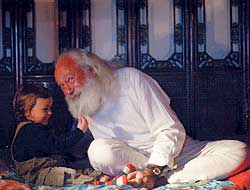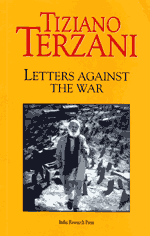 There are few people in my ink-stained line of work who are true originals. One of them is Tiziano Terzani. For decades, he has roamed Asia and the world on behalf of Germany's Der Spiegel and a few Italian newspapers. Always dressed in crisp white linen, Terzani brought his humanist, European perspective to almost every crisis that has gripped this continent, from the Vietnam war to the killing fields of Cambodia, from the Babri Mosque riots in India to-most recently-the American assault on the Taleban and the search for Osama bin Laden. I dare say Nepal has seen him a time or two as well.
There are few people in my ink-stained line of work who are true originals. One of them is Tiziano Terzani. For decades, he has roamed Asia and the world on behalf of Germany's Der Spiegel and a few Italian newspapers. Always dressed in crisp white linen, Terzani brought his humanist, European perspective to almost every crisis that has gripped this continent, from the Vietnam war to the killing fields of Cambodia, from the Babri Mosque riots in India to-most recently-the American assault on the Taleban and the search for Osama bin Laden. I dare say Nepal has seen him a time or two as well. Now a German organisation follows the rules of employment laid down by the government back home, so when Terzani's 65th birthday was approaching last September, he knew that it would soon be time for him retire. Then came 11 September, 2001. Terzani retired on schedule but moved by the horror of the terrorist atrocities in America, and later the American response to them, he packed his pen and started travelling again. This time though, the great man of Asian journalism wasn't recording events and the thoughts of kings and warlords for Der Spiegel. He was writing front-page letters in Italy's largest newspaper, Corriere della Sera, letters of anguish, fear, anger and eventually hope. Tiziano Terzani has collected those letters in his latest book, Letters Against the War.

On the back cover, a short sentence says it all. "After 30 years as a war correspondent for a major European magazine, Tiziano Terzani turns into a correspondent against all wars". This is not one of those spurious bits of praise known in the trade as a "blurb", the sort of thing you ask a friend to write before even showing him the book. No, I dare say Terzani, never shy of the theatrical gesture, has given himself the title of "correspondent against all wars". At first, I fought shy of the concept. The tenets of objectivity are engraved on my soul. I may hold opinions, and willingly disseminate them at the drop of a hat, but not as a journalist, and never in my news reporting.
 Terzani was much the same in the long course of his career. His reporting-sharp, incisive, interesting-was no parade of polemic. But in the evening of his life, the late night of his career, this distinguished fellow has dropped all pretence of journalism and is now a pamphleteer, a campaigner for a worthy cause, and that cause is peace. Some time ago in the pages of this newspaper, an earnest fellow from some earnest country argued in a somewhat earnest manner that we needed fewer war correspondents in international journalism, and more "peace correspondents". I snorted with slightly weary cynicism at the time and pointed out to whoever would listen that such a notion could hardly be journalistic. You weren't getting all available sides to a story, then printing them without comment. You were commenting by choosing your sides.
Terzani was much the same in the long course of his career. His reporting-sharp, incisive, interesting-was no parade of polemic. But in the evening of his life, the late night of his career, this distinguished fellow has dropped all pretence of journalism and is now a pamphleteer, a campaigner for a worthy cause, and that cause is peace. Some time ago in the pages of this newspaper, an earnest fellow from some earnest country argued in a somewhat earnest manner that we needed fewer war correspondents in international journalism, and more "peace correspondents". I snorted with slightly weary cynicism at the time and pointed out to whoever would listen that such a notion could hardly be journalistic. You weren't getting all available sides to a story, then printing them without comment. You were commenting by choosing your sides. Having read the first book of "peace correspondence", I remain sceptical. Letters Against the War is not a bad read, not at all. Terzani writes with passion and precision; his arguments are worth listening too; his sincerity unquestioned. The anecdotes from the well-trodden trails of post-11 September journalism-jihadis in Peshawar, the reconstruction and development gravy train in Kabul, the civilian casualties of American bombing in Afghanistan-are familiar ones, and they serve Terzani's main thesis well. War is hell, the innocent suffer, and we rarely learn a damn thing from the bloodstains and failures of history. He suffers a little from the instinctive anti-Americanism of the European, the failure to see just how flexible American culture and politics can be. But this isn't why I am not yet convinced by the notion of a "peace correspondent".
This is a book that should be read by people on all sides of political opinion about the "war against terror". It is literate, humane and convincing. If logic lay behind decisions to make war, then arguments like this would most certainly bring us peace. But I fear we are violent, territorial beasts, afraid of the dark and apt to lash out at the mildest of provocation. We are lavish with revenge, and ration forgiveness. Most of all, we ignore the wisdom of experience and age. Still, Terzani may be onto something here and I could be wrong. And for once, I hope I am. t
(Letters Against the War, India Research Press, New Delhi, 2002.)



